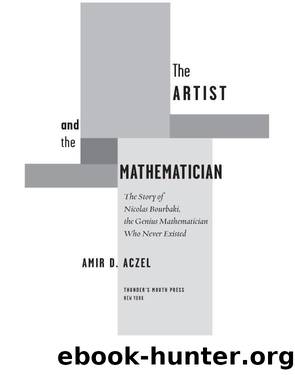The Artist and the Mathematician by Amir Aczel

Author:Amir Aczel
Language: eng
Format: epub
Publisher: Perseus
Published: 2010-05-31T16:00:00+00:00
THE MEMBERS OF the Bourbaki group recognized only one French mathematician of the pre-Bourbaki era as their godfather: the geometer Elie Cartan, Henri’s father. Other French mathematicians of the generation before Bourbaki were not well liked, including Lebesgue and Poincaré.
During the 1950s, when Pierre Cartier joined Bourbaki, it was not fashionable to value the work of Henri Poincaré, who was one of the most important French mathematicians of all time. Poincaré was called “the last universalist.” He was a mathematician who understood a great deal about a very wide range of mathematical topics. Poincaré derived very important results in mathematics, and a conjecture he had made a century ago now seems to have been proved by contemporary Russian mathematician Grigori Perelman. But Bourbaki viewed Poincaré’s way of doing mathematics as old-fashioned. Poincaré’s style of doing mathematics and the style of Bourbaki were at odds with each other.15 Poincaré was intuitive and detail-oriented. To him, mathematics was an art. He did not care about structures or axiomatics. He cared about seeing things clearly and producing results—in whatever way he could.
In the 1960s, a new generation joined the group: the fourth generation of Bourbaki. These were mostly former students of Alexandre Grothendieck. Grothendieck himself was a member of Bourbaki for about ten years, and contributed greatly to the development of modern mathematics. But he came to a conflict with the group, and left it in anger. Before he left, there were frequent clashes within the group, as well as generational conflicts.16
As Armand Borel wrote, “The fifties also saw the emergence of someone who was even more of an incarnation of Bourbaki in his quest for the most powerful, most general, and most basic—namely, Alexandre Grothendieck.”17 Grothendieck “quickly made mincemeat of many problems on topological vector spaces put to him by Dieudonné and Schwartz, and proceeded to establish a far-reaching theory. Then he turned his attention to algebraic topology, analytic and algebraic geometry, and soon came up with a version of the Riemann-Roch theorem that took everyone by surprise, already by its formulation, steeped in functorial thinking, way ahead of anyone else. As major as it was, it turned out to be just the beginning of his fundamental work in algebraic geometry.”18
Grothendieck was unhappy with Bourbaki because he felt their work and aims were not ambitious enough. Eventually, he would write his own series of books, and leave Bourbaki. By the fourth generation, the goal of the group was not as clear as it had been earlier. Grothendieck had by then developed his own, more ambitious, program outside of Bourbaki. Thus the need for Bourbaki was less obvious, and a lack of a global understanding of mathematics was beginning to manifest itself vis-à-vis these new developments.19 The members of the group had become more specialized in their interests, and less able to see the larger picture.
Download
This site does not store any files on its server. We only index and link to content provided by other sites. Please contact the content providers to delete copyright contents if any and email us, we'll remove relevant links or contents immediately.
| Algebra | Calculus |
| Combinatorics | Discrete Mathematics |
| Finite Mathematics | Fractals |
| Functional Analysis | Group Theory |
| Logic | Number Theory |
| Set Theory |
Modelling of Convective Heat and Mass Transfer in Rotating Flows by Igor V. Shevchuk(6439)
Weapons of Math Destruction by Cathy O'Neil(6278)
Factfulness: Ten Reasons We're Wrong About the World – and Why Things Are Better Than You Think by Hans Rosling(4742)
A Mind For Numbers: How to Excel at Math and Science (Even If You Flunked Algebra) by Barbara Oakley(3305)
Descartes' Error by Antonio Damasio(3277)
Factfulness_Ten Reasons We're Wrong About the World_and Why Things Are Better Than You Think by Hans Rosling(3237)
TCP IP by Todd Lammle(3183)
Fooled by Randomness: The Hidden Role of Chance in Life and in the Markets by Nassim Nicholas Taleb(3123)
The Tyranny of Metrics by Jerry Z. Muller(3072)
Applied Predictive Modeling by Max Kuhn & Kjell Johnson(3070)
The Book of Numbers by Peter Bentley(2968)
The Great Unknown by Marcus du Sautoy(2694)
Once Upon an Algorithm by Martin Erwig(2649)
Easy Algebra Step-by-Step by Sandra Luna McCune(2635)
Lady Luck by Kristen Ashley(2578)
Police Exams Prep 2018-2019 by Kaplan Test Prep(2546)
Practical Guide To Principal Component Methods in R (Multivariate Analysis Book 2) by Alboukadel Kassambara(2543)
All Things Reconsidered by Bill Thompson III(2393)
Linear Time-Invariant Systems, Behaviors and Modules by Ulrich Oberst & Martin Scheicher & Ingrid Scheicher(2368)
